MYANMAR
Overview
In 2000, Metta Development Foundation, through its agricultural advisor Humayun Kabir, conducted its first experiments with SRI in Kachin State. After a disappointing first year (yields of 1.97-2.73 t/ha - apparently due to late planting) the 2001 average was 5.5 t/ha compared with the typical yield of 2.5 t/ha. In the next two years, the average remained over 5 t/ha, with a few yields reaching into the 10+ t/ha range.
Between 2001 and 2005, Metta has conducted more than 600 Farmer Field Schools (FSS) where SRI has been taught as the major strategy for rice cultivation. Kabir estimated that as many as 50,000 farmers in Kachin and Shan States who participated in the Metta-sponsored FFS training or learned the methods from participants are using SRI in various degrees; at least 15% of these, or 7,500 farmers, were believed to be using all the main practices of SRI by 2006. In 2006, Kabir completed a PhD dissertation on Adaptation and adoption of the System of Rice Intensification (SRI) in Myanmar using the Farmer Field School (FFS) approach.
During the 2007 wet season, full-scale SRI (at least 5 to 6 of the practices) was in use on around 10,000 acres in Metta program areas. (Kabir estimated that approximately 150,000 acres are cultivated using some of the SRI practices.) Rice yields, which vary significantly with the practices used, are reported from 4 tons per hectare to 10 tons/ha, with most of the averages from 5 to 6 tons/ha (an increase of 100 to 300% over baseline yields of 2 to 3 tons/ha) (see report).
During 2008, SRI methods were introduced by Metta Foundation in lowland Ayerawadi division, which is in the ‘rice bowl’ of Myanmar. The good success there is due to good water control and farmers' desire to lower their agrochemical-related production costs. Among other NGOs working with SRI as of 2008 were: GRET in Rakhine State, GAA (German Agro-Action) in Wa region and Ayerawadi division, and World Concern in Kachin, Shan and Chin states. A consortium of 20 primarily local NGOs, known as the Food Security Working Group (FSWG) is also supporting SRI trials.
In 2009-2010, the Metta Development Foundation expanded SRI promotion with CARITAS-Swiss funding to help cyclone-affected communities in the Delta region to recover from the extensive damage caused by Cyclone Nargis. Trained in Farmer Field Schools, 633 farmers cultivated 679 acres of rice, harvesting a total of 808 metric tons of rice in three townships of the Ayerawadi division. SRI modifications included experiments with direct seeding using labor-saving drum seeders (see report). During 2013, SRI began operating through the a Farmer Field School set up in Loi Law in Kachin state by Swiss Aid and local organization Aung Sett Kyar, with funding from the Livelihood and Food Security Trust Fund (LIFT). During 2017, SRI is being introduced in Shwebo District, Sagaing, to grow Shwebo Pawsan premium rice varieties by United Nilar Agribusiness Co. Ltd. and the Sagaing Region Agricultural Department. It is hoped that SRI methods will raise yields and reduce pesticide use. As of 2015, Kin Maung Latt from Metta Development Foundation listed 10 NGOs, churches and other agencies that were involved with SRI in Myanmar.
An international SRI delegation traveled to Myanmar April 23-25, 2018, and participated in a SRI workshop sponsored by Myanmar's Department of Agriculture Research, a meeting with stakeholders from development groups and the private sector hosted by the Myanmar Rice Federation, and field visits to farms and rice mills. An SRI manual was produced by Thein Su, who also represented Myanmar at the Workshop to Enhance Cooperation and Sharing among SRI National Networks in Asia, held October 18-19, 2018, in Johor Bahru, Malaysia. Thein Su's presentation at the event gives an overview of SRI in Myanmar, including which NGOs and government agencies are active in investigating or extending SRI. Farmer Field Schools are popular in Myanmar for extending SRI and has shown good results. (See below items from 2018 and 2020.) Additional SRI outreach efforts in 2020 by Thein Su include training materials, field days, and presentations. (Thein Su has been providing SRI outreach to the NGO community for a number of years.) According to a LWF article and excellent accompanying video, LWF has trained over 50 farming families in Myanmar in SRI methods since 2019.
Progress and Activities
2022 Updates
 Lutheran World Federation Myanmar and ACT Alliance Partners Promote SRI in Kayin State
Lutheran World Federation Myanmar and ACT Alliance Partners Promote SRI in Kayin State
[March 3, 2022] The Lutheran World Federation (LWF) is promoting long-term resilience in Myanmar by helping farmers in the Kayin State learn about the System of Rice Intensification (SRI) to increase production, improve the quality of seedlings, and implement more sustainable practices. According to a LWF article and excellent accompanying video, LWF has trained over 50 farming families in
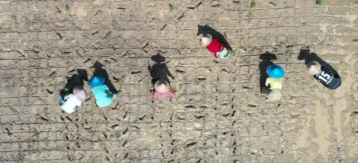 Myanmar in SRI methods since 2019. SRI requires a smaller investment than traditional rice production methods, uses less water, and produces higher yields.
Myanmar in SRI methods since 2019. SRI requires a smaller investment than traditional rice production methods, uses less water, and produces higher yields. U Saw Htein Linn, one of the first farmers to adopt SRI said “I was quite interested in the new method because I enjoy experimenting with technologies... I also joined a Facebook group called network of SRI friends to share experiences and knowledge.” He adds, “with the SRI method the rice plants are stronger, more resistant to flood, draught, heavy winds, pests, and diseases. Yields are also higher. 10 baskets of paddy from the traditional method would yield 3.5 baskets of milled rice, SRI yields 4.” SRI has allowed farmers to gain more independence in rice seed selection. Linn states, “in the past we would collect paddy from the harvest and replant the next year. It would last 5 to 6 years as seed quality decreased with each season. We would then go to the department of agriculture to buy new seeds. With SRI the quality of seeds is consistent in addition to selling for food, I now also sell my high-quality paddy as seeds. People are purchasing their paddy from me and don’t need to travel to the city.” Daw San San Chit, Linn’s wife shares that the improvement of the quality of their yields and living condition has allowed them to give back to the community and those most in need. “Our family has donated to the vulnerable elderly, orphans and the monastery. The profit has been enough that we can afford to purchase and donate food to our community. We are taking better care of our children and will continue to apply the SRI.” [See LWF article and video.]
2020
 Thein Su Conducts Multiple SRI Outreach Efforts throughout Myanmar
Thein Su Conducts Multiple SRI Outreach Efforts throughout Myanmar
[November 10, 2020] Thein Su has been carrying out SRI training, research and public outreach initiatives in Myanmar for over a decade. Most recently, he prepared an updated SRI Farmer Handbook (at left; also available
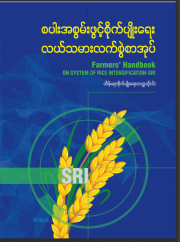 on slideshare) which he uses in conjunction with his extension efforts.The manual is also available to the general public. Thus far in 2020, he has held 22 trainings for 1,695 farmers, primarily in Sagaing Region, but also in Magwe Region and Southern Shan State.
on slideshare) which he uses in conjunction with his extension efforts.The manual is also available to the general public. Thus far in 2020, he has held 22 trainings for 1,695 farmers, primarily in Sagaing Region, but also in Magwe Region and Southern Shan State. 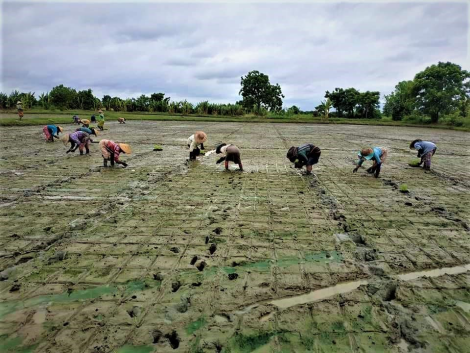 During 2019, Thein Su trained 1,000 farmers in 80 SRI training sessions and, during 2016-2018, 1,550 farmers attended one of 27 field learning days he lead.
During 2019, Thein Su trained 1,000 farmers in 80 SRI training sessions and, during 2016-2018, 1,550 farmers attended one of 27 field learning days he lead. Thein Su also presented an SRI webinar for academics and the general public during November, which is available as a YouTube video. For more information on his SRI efforts, see both Thein Su's Facebook page and the Facebook Group "Network of SRI Friends," an active online Burmese language group with over 1,700 members [For more information, see SRI Farmer Handbook (pdf and Slideshare versions), presentation video, or join the SRI online group.]
 Energy Use Efficiency and Cost-Benefits Analysis of Rice Cultivation Favor SRI Methods
Energy Use Efficiency and Cost-Benefits Analysis of Rice Cultivation Favor SRI Methods
[October 20, 2020] A recent article in the journal Energy presented the results of a study assessing the energy use efficiency (EUE) and cost benefit of alternative rice cultivation methods in the summer rice growing season of Central Myanmar. Ensuring efficient energy use confers tremendous environmental benefits over time. Four different rice cultivation methods used in Central Myanmar were assessed from a sustainability standpoint: System of Rice Intensification (SRI) (T1); modified SRI (T2); conventional transplanted rice cultivation; (T3) and direct seeding (T4). The study found that the two SRI methods required significantly less total energy inputs than conventional methods. It also showed that EUE was significantly higher in T2 compared to T3 and T4. The cost-benefit analysis indicates that the two SRI methods were significantly higher than those of conventional methods. It found that the energy indices and economic parameters of T2 were affected positively as indicated by the fewer inputs required to produce rice using this method. The study concluded that the modified SRI method is promising for rice cultivation strategy in Central Myanmar and its adjoining regions.The modified SRI (T2) method had the highest EUE due to the significantly low total energy input consumed and statistically similar total energy output. Overall, the modified SRI (T2) method decreased energy input consumption; such as chemical fertiliser, human labour, seeds, and water; in comparison to T3 and T4.
 ACT Alliance Partnership in Myanmar Includes SRI Farmer Field School in Kayin State
ACT Alliance Partnership in Myanmar Includes SRI Farmer Field School in Kayin State
[January 6, 2020] An article by the Church World Service Representative in Myanmar reported on a recent visit to several ACT Alliance joint programs in Kayin State, near the border with Thailand. The ACT Alliance, which has 10 member organizations in Myanmar, is working with a key local organization, the Karen Baptist Convention to help families improve their livelihoods there. The Farmer Field School (FFS) that they are supporting is focused on how to adapt planting techniques in the face of climate change, primarily the System of Rice Intensification. As SRI uses less water, it is considered especially important in areas with water challenges, which is most of southeastern Myanmar. During the visit, the group talked to four farmers who had been introduced to SRI in 2019. They reported that their first harvests had yielded three times as much rice as usual, which was good news for families since they have more rice to eat and many rural families make a living selling rice. The article concludes that, as climate change makes rainfall less predictable and consistent, climate-adaptive agriculture is growing in importance.
The authors conclude it is possible that the EUE of rice cultivation in Myanmar can be improved in an environmentally friendly manner. There are about 1 million hectares of summer rice fields in Myanmar. The modified SRI (T2) method can improve gross profits (by about 180 to 365 million USD) and save total energy consumption (by about 1,100,000GJ to 1,400,000GJ) in the summer rice growing season in comparison to T3 and T4. This will lead to an increase in soil fertility and coincides with Myanmar's current objective to save water because there are signs that water scarcity will give rise to competition between the rice cultivation industry and other industries. Policy makers may use these results to improve EUE, sustainable productivity, and profitability of rice cultivation in Myanmar. [See Htwe et al article for details.]
2019
 Yezin Researchers Investigate the Effects of Nitrogen Fertilizer Levels and Spacing on Phyllochron, Yield and Yield Components under SRI Management
Yezin Researchers Investigate the Effects of Nitrogen Fertilizer Levels and Spacing on Phyllochron, Yield and Yield Components under SRI Management
[January 27, 2020] An article by researchers at Yezin Agricultural University published in the Journal of Agricultural Research reports on the effects of different nitrogen fertilizer levels and spacing on phyllochron, yield and yield components under SRI management. The experiments were conducted to investigate the effects of different nitrogen levels and spacing on phyllochron until flag leaf and to determine interaction effects of different nitrogen fertilizer levels and spacing on the phyllochron, yield and yield components of rice under SRI. Four levels of nitrogen fertilizer rate (0, 45, 85 and 125 kg N ha-1) and three spacing (15 × 15, 20 × 20 and 25 × 25 cm) were laid out in 4 × 3 factorial in randomized complete block design with three replications in both dry and wet seasons. In general, phyllochrons were shorter as N amount increased. The wider spacing resulted the shorter phyllochrons. The highest nitrogen fertilizer rate N3(125 kg N ha-1) and the widest spacing of S3(25 × 25 cm) gave the higher yield, yield components and agronomic parameters than the others. But, the maximum leaf area index (LAI), leaf dry weight (LDW), total dry matter (TDM) and crop growth rate (CGR) were produced by S1(15 × 15 cm) in both seasons. The combination effect of nitrogen fertilizer and spacing showed that the maximum yield was obtained from N3S3(125 kg N ha-1+ (25 × 25 cm)) in both seasons. Hence, the fertilizer rate 125 kg N ha-1with spacing 25 × 25 cm was recommended by th researchers in order to attain high grain yield under SRI. [Note: There are a number of organic SRI projects undertaken by NGOs in Myanmar that have achieved high yields without synthetic fertilizers.]
2018
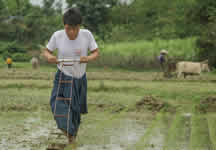
 Enthusiasm Grows for SRI in Rakhine State through the Tat Lan Programme's Efforts
Enthusiasm Grows for SRI in Rakhine State through the Tat Lan Programme's Efforts
[December 7, 2018] An article on Tat Lan's website details the hope that farmers have found after adopting SRI in Rakhine State. After attending the Tat Lan Programme's Farmer Field School (FFS) to learn SRI methods along with other farmers from Myebon and Minbya, Ko Maung Nge was amazed at the increase in productivity. The FFS experience connected them with farmers in Naypyidaw and Yangon who were cultivating paddy with SRI and provided demonstrations and encouragement in adopting the new techniques. After seeing his bumper harvest, Ko Maung Nge relayed that “It is impossible to keep going using the traditional ways.” Farmers in Rakhine State have traditionally either planted rice by broadcasting or random transplanting, both of which are expensive and low yielding, thereby contributing to high levels of indebtedness and poverty in central Rakhine. Broadcasting saves labor, but uses a lot of seed, while random transplanting uses much less seed but requires as many as 20 workers, adding significantly to labour costs. And, both methods present an additional challenge: clearing weeds. High out-migration from rural Rakhine State has significantly pushed up the cost of labor, making manual planting and weeding an expense that few can afford. Instead, most farmers have left weeds to grow, decreasing the quality and production of the rice. With SRI, a rotary hand weeder enables farmers to weed their fields themselves without having to hire additional workers. Tat Lan believed correctly that SRI methods could cut cultivation costs and increase yields at the same time. [...for details, read the full article by Moh Moh Thaw.]
 Thein Su Represents Myanmar at SRI Asia Networks Workshop in Johor, Malaysia
Thein Su Represents Myanmar at SRI Asia Networks Workshop in Johor, Malaysia
 [November 1, 2018] U Thein Su represented Myanmar and made a presentation at the Workshop to Enhance Cooperation and Sharing among SRI National Networks in Asia, held October 18-19, 2018, in Johor Bahru, Malaysia. The event, which was attended by 50 participants from 17 countries, was organized by the Malaysian Agroecology Society (SRI-Mas), the Asian Centre of Innovation for Sustainable Agriculture Intensification (ACISAI) at the Asian Institute of Technology, and SRI-Rice at Cornell University, allowed SRI network representatives and other stakeholders to share experiences and to investigate opportunities to collaborate on scaling-up, multi-country research, value chain improvements, accessing resources, and capacity building for SRI networks. The event also mapped out the possibilities for forming an Asia Regional SRI Network from the ten Asian SRI networks that operating the region. While Myanmar currently has no national SRI network, Thein Su brought information on the current state of SRI promotion and adoption in Myanmar and discussed how NGOs and government agencies in Myanmar who are interested in SRI could possibly benefit from and contribute to an SRI Regional Network for Asia. [Workshop presentations by other participants are also available.]
[November 1, 2018] U Thein Su represented Myanmar and made a presentation at the Workshop to Enhance Cooperation and Sharing among SRI National Networks in Asia, held October 18-19, 2018, in Johor Bahru, Malaysia. The event, which was attended by 50 participants from 17 countries, was organized by the Malaysian Agroecology Society (SRI-Mas), the Asian Centre of Innovation for Sustainable Agriculture Intensification (ACISAI) at the Asian Institute of Technology, and SRI-Rice at Cornell University, allowed SRI network representatives and other stakeholders to share experiences and to investigate opportunities to collaborate on scaling-up, multi-country research, value chain improvements, accessing resources, and capacity building for SRI networks. The event also mapped out the possibilities for forming an Asia Regional SRI Network from the ten Asian SRI networks that operating the region. While Myanmar currently has no national SRI network, Thein Su brought information on the current state of SRI promotion and adoption in Myanmar and discussed how NGOs and government agencies in Myanmar who are interested in SRI could possibly benefit from and contribute to an SRI Regional Network for Asia. [Workshop presentations by other participants are also available.]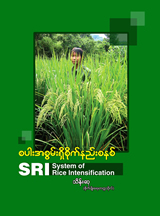
 SRI FAQs Published in Burmese
SRI FAQs Published in Burmese
[April 30, 2018] A new Burmese language publication about SRI incorporates portions of Norman Uphoff's book entitled The System of Rice Intensification (SRI) - Responses to Frequently Asked Questions. The 39-page book, which was put together by U Thein Su, also includes Su's experiences with promoting SRI in Myanmar over the past decade. See also his facebook page that recounts many of his SRI trainings throughout Myanmar. [An updated version will be produced later during 2018]
 International SRI Delegation Visits Myanmar
International SRI Delegation Visits Myanmar
[April 25, 2018] An international SRI delegation traveled to Myanmar April 23-25, 2018, to learn more about SRI research, promotion, adoption and marketing opportunities there. The delegation, which included representatives from SRI-Rice, Lotus Foods and Metta Development Foundation, as well as Yang Saing Koma from Cambodia, Maymay Lim (who arranged for the visit), and local consultant Thein Su, participated in a SRI workshop sponsored by Myanmar's Department of Agriculture Research, a meeting with stakeholders from development groups and the private sector hosted by the Myanmar Rice Federation, and field visits to farms and rice mills. The group also met with the Minister of Agriculture, Livestock and Irrigation, Dr. Aung Thu. Some additional context is provided in an interview with Thein Su made during the visit.
2017
 Meet Saw Htoo Baw: A Small Farmer with Big Dreams to Go Organic
Meet Saw Htoo Baw: A Small Farmer with Big Dreams to Go Organic
[July 20, 2017] An article on the Asia Pacific Farmers Forum website relates the story of of Saw Htoo Baw, a young farmer from Tha Bite Kone village, Hle Gu Township, who is a member of the Agricultural Farmer Federation of Myanmar (AFFM). He was selected to attend a ten-month residential intensive training program at NEED-Myanmar, an Eco Village Farm School (one of AFFM’s main partners). At the end of his training at NEED, Saw Htoo Baw returned home and combined high quality organic compost with System of Rice Intensification (SRI) for cultivation on three of the 30 acres family farm land. Four of the five neighboring farmers also adopted certain SRI techniques in the first year itself bringing a total of 20 acres of paddy cultivation under SRI methods. Even with these modest changes, Saw Htoo Baw was able to earn a reasonably higher income than he normally would, though the production output did not increase much. Other farmers were also happy with the success of their trials and believed that SRI method will solve a lot of the economic and environmental problems they are facing.
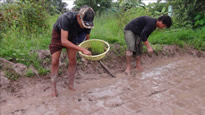
According to the article, these results are promising and would be of interest to many farmers and also to government agricultural departments since it is low input, easy to learn, and improves income in a relatively short time without burdening the system or the environment. In 2017, the number of farmers using SRI techniques increased from 5 to 7 in Saw Htoo Baw’s village with area of cultivation increasing from 20 to 70 acres. The farmers all follow the organic composting aspect and its application for cultivation, though not all of them strictly practice the SRI method. Instead, they adopt certain techniques to be able to compare and see the benefits. Saw Htoo Baw feels this is a positive healthy transition for farmers to slowly make changes without risking too much of their crop and thus gaining confidence to make bigger changes.
Saw Htoo Baw feels that due to intensive chemical farming, a lot of the beneficial predators disappeared with a huge increase in crop damaging pests like snails. Therefore without some form of pest control, farmers can lose their entire crop. To address this, he has steadily increased the number of animal systems on the farm. He now has 150 ducklings that to help control snails and an additional turkeys, geese and chickens that roam the farm and deposit nutrient rich manure all over while also turning the soil and consuming pests. Saw Htoo Baw wants to emphasize that partnering with animals can be done without the need of investing in commercial animal food and in turn animals provide food, labour, manure, and even income. While most farmers in the region today have sold off their cows, Saw Htoo Baw has bought 8 cows and hopes to encourage the traditional way of farming paddy instead of using machines and encouraged others to maintain at least a pair of cows even if they don’t use them for ploughing. Saw Htoo Baw understands the importance of cows in an agricultural environment and the multiple benefits they provide such as manure, milk and labour for maintaining grasslands and that without this, farmers will not be able to progress beyond a certain point. According to Saw Htoo Baw, his next challenge is that of marketing and presenting the produce to consumers. The farm to customer logistics is important to ensure that more farmers can adopt and succeed in natural farming, otherwise farmers will not have the final incentive to make the change to alternative farming. [See article for additional details.]
 SRI Promoted for Agribusiness Efforts in Shwebo District, Sagaing
SRI Promoted for Agribusiness Efforts in Shwebo District, Sagaing
[July 10, 2017]
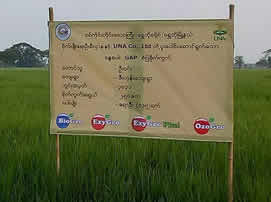 According to an article in the Global New Light of Myanmar, the System of Rice Intensification will be introduced in Shwebo District, Sagaing, by United Nilar Agribusiness Co. Ltd. and the Sagaing Region Agricultural Department, to grow Shwebo Pawsan premium rice varieties.
It is expected that SRI methods will reduce reliance on pesticides and increase yields by keeping fields continuously saturated to promote aerobic soil organisms, by optimally spacing plants to maximize light exposure, and by transplanting seedlings less than two weeks old to reduce shock to the plants. To cultivate the Shwebo Pawsan in Sagaing Region, the Agricultural department and the United Nilar Agribusiness will use SRI methods on 20 acres of paddy fields in Shwebo Township, and 10 acres each in the townships of in Tabayin, Ye-U and Wetlet.
According to an article in the Global New Light of Myanmar, the System of Rice Intensification will be introduced in Shwebo District, Sagaing, by United Nilar Agribusiness Co. Ltd. and the Sagaing Region Agricultural Department, to grow Shwebo Pawsan premium rice varieties.
It is expected that SRI methods will reduce reliance on pesticides and increase yields by keeping fields continuously saturated to promote aerobic soil organisms, by optimally spacing plants to maximize light exposure, and by transplanting seedlings less than two weeks old to reduce shock to the plants. To cultivate the Shwebo Pawsan in Sagaing Region, the Agricultural department and the United Nilar Agribusiness will use SRI methods on 20 acres of paddy fields in Shwebo Township, and 10 acres each in the townships of in Tabayin, Ye-U and Wetlet.While the United Nilar Agribusiness will provide pesticides worth Ks300,000 (~220$US) free of charge to local farmers, U Myint Kyi, an agricultural consultant from United Nilar Agribusiness, said that rice farmers used to apply pesticides to reduce insect infestation but since international markets often balk at use of toxic chemicals on edible crops farmers will now experiment with SRI. “Local farmers will also see the effect of growing paddy with SRI when compared with other paddy fields,” he said. The local farmers have reportedly agreed to grow the monsoon paddy with SRI methods because they have already seen the effect of the summer paddy. United Nilar Agribusiness plans to help the local farmers starting from sowing the seeds till harvest. The farmers will have a choice between using more pesticides or reducing their use in favor of SRI methods. [See article for details.]
2016
 President Visits Toungoo, Bago Region; Learns of SRI from Farmers
President Visits Toungoo, Bago Region; Learns of SRI from Farmers
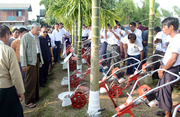 [September 23, 2016] According to an article in the Myanmar press, President U Htin Kyaw visited a 200-acre integrated farm operated by U Than Myint, a local farmer of Moegaung Village in Toungoo, Bago Region. Accompanied by Union Ministers Dr. Pe Myint and Dr. Aung Thu, the President met with local farmers from the farm and heard the System of Rice Intensification (SRI) from Myint. In his address, the President called for creativity and diligence to bring about a better generation in a shift to agricultural mechanization. After the meeting, he observed SRI-oriented model farmlands and farming implements. [See article in The Global New Light of Myanmar.]
[September 23, 2016] According to an article in the Myanmar press, President U Htin Kyaw visited a 200-acre integrated farm operated by U Than Myint, a local farmer of Moegaung Village in Toungoo, Bago Region. Accompanied by Union Ministers Dr. Pe Myint and Dr. Aung Thu, the President met with local farmers from the farm and heard the System of Rice Intensification (SRI) from Myint. In his address, the President called for creativity and diligence to bring about a better generation in a shift to agricultural mechanization. After the meeting, he observed SRI-oriented model farmlands and farming implements. [See article in The Global New Light of Myanmar.]
2014
 Video Shows FFS Results in SRI Promotion in Metta Foundation's Nargis Post-Cyclone Initiative
Video Shows FFS Results in SRI Promotion in Metta Foundation's Nargis Post-Cyclone Initiative
[June 2014] A video published on YouTube's shwe yone channel documents results of Daw Khin Aye and her fellow rice farmers after completing Farmer Field School SRI training through Metta Foundation's Nargis Post-Cyclone Initiative. Farmers were able to double their yields by planting 8-10 day-old single seedlings and managing their fields with SRI methods.
2013
 SRI Continues in Kachin Province through Farmer Field Schools
SRI Continues in Kachin Province through Farmer Field Schools
[November 14, 2013] SRI is being promoted through the first Farmer Field School set up in Loi Law in Kachin state by Swiss Aid and local organization Aung Sett Kyar, with funding from the Livelihood and Food Security Trust Fund (LIFT), a multi-donor fund managed by the United Nations. The pilot plot, less than half an acre, and the farmers' own fields are the classrooms. The five farmers who took up SRI in June 2013 were hopeful they could increase their yields from the usual yield of about 40 baskets to at least 70 baskets. The FFS teacher, Aung Zay Ya, is a farmer from a nearby village who graduated from a training course conducted by the Metta Development Foundation, one of Myanmar’s largest non-governmental organizations, which started promoting SRI through the Farmer Field Schools in 2001 (See article in Thomson Reuters Foundation). (For additional information on the earlier SRI work by MDF, see the Myanmar overview.)
 SRI Adapted to Upland Conditions Through the Use of Rake, Drum Seeder, and Weeder in Shan State
SRI Adapted to Upland Conditions Through the Use of Rake, Drum Seeder, and Weeder in Shan State
[January 2013] Humayun Kabir produced a video showing how the SRI can be successfully adapted to upland rainfed rice cultivation, where weeds can be the major challenge because there is no irrigated flooding. In rainfed conditions, where rice is grown by broadcasting of seeds, there is no other way of clearing out weeds except manual weeding. Generally, 25-30 laborers are needed to hand-weed an acre of rainfed rice, which makes this the major cost of rice production. In 2010, Metta Development Foundation introduced a modification of SRI for the rainfed areas of Shan State in Myanmar. The method includes a rake to make furrows in perfectly aligned rows, a drum seeder to drop seeds in the furrows at regular intervals and a rotary weeder designed for rainfed conditions. This set of implements is giving farmers nearly 100% increase in yield over that with their traditional methods (1-1.5 tons/ha to 2-3 tons/ha), while reducing their production costs to a large extent, thereby greatly enhancing their net household incomes. (See video for details.)
2009-2010
 Weed Management for SRI Yetzin Agricultural University Master's
Thesis
Weed Management for SRI Yetzin Agricultural University Master's
Thesis
In a master's thesis undertaken at Yetzin Agricultural University in Myanmar, Soe Thura evaluated the effectiveness of different weed control methods in SRI by carrying out two experiments during the dry and wet seasons of 2009. Six treatments, including a control without weeding and various combinations of hand-weeding, use of rotary weeder and herbicide application, were undertaken using a randomized complete block design. Yield loss due to weed competition in the experiments ranged from 49.97% to 74.06%. An economic analysis indicated that rotary weeding at 15 days after transplanting (DAT) followed by hand-weeding at 35 DAT was the most cost-effective weeding method for SRI when compared to other combinations of hand-weeding, rotary weeding and herbicide application (see thesis for details).
 Researchers at Taungoo University are Using SRI Methods to Grow Rice on
50 Acres
Researchers at Taungoo University are Using SRI Methods to Grow Rice on
50 Acres
[August 22, 2010] According to an article in the Myanmar Times (August 22, 2010), researchers at Taungoo University are using SRI methods to grow rice on 50 acres of their 285-acre compound. In October or November they are planning to share their experience with local farmers, who are being encouraged to switch to SRI in the hopes of increasing their yield. Dr. Aung Thu, the university rector, said that three of the 50 acres will be purely organic.
 Adaptation of SRI in the Ayerawadi Delta of Myanmar by the Metta
Foundation
Adaptation of SRI in the Ayerawadi Delta of Myanmar by the Metta
Foundation
With funding from CARITAS-Swiss, the Metta Development Foundation, an indigenous NGO, mounted a project introducing SRI to help cyclone-affected communities in the Delta region to recover from the extensive damage caused by Cyclone Nargis in 2009. Farmer Field Schools (FFSs) were introduced to train farmers on the principles and techniques of SRI as an entry-point methodology for restoring rice cultivation.
According to a report by Humayun Kabir, the Metta Development Foundation's agricultural advisor, 35 facilitators trained by the Metta-CARITAS project conducted 33 FFSs in Laputta, Myaungmya,
 Pathein and
Kangyidaung townships of Ayerarwadi division in the 2009 rainy season. A total
of 688 farmers (617 male and 71 female) participated in these schools,
averaging 21 farmers per FFS. The project distributed drum seeders and rotary
weeders to the farmers to use with SRI methods on their fields. Among those
trained, 633 farmers proceeded to cultivate a total of 679 acres of rice. From
the cultivated 679 acres, a total of 40,398 baskets (808 metric tons of new
rice), worth US$ 202,000 at the current local price, were produced. (click on
photo at right to enlarge)
Pathein and
Kangyidaung townships of Ayerarwadi division in the 2009 rainy season. A total
of 688 farmers (617 male and 71 female) participated in these schools,
averaging 21 farmers per FFS. The project distributed drum seeders and rotary
weeders to the farmers to use with SRI methods on their fields. Among those
trained, 633 farmers proceeded to cultivate a total of 679 acres of rice. From
the cultivated 679 acres, a total of 40,398 baskets (808 metric tons of new
rice), worth US$ 202,000 at the current local price, were produced. (click on
photo at right to enlarge)Three modifications of SRI were used by these farmers. Because of the rainy season, a majority used seedlings 15-20 days old, a little older than recommended, but more than 10% of the farmers did use very young seedlings, 8-10 days old. Another 10% used the drum seeder to sow seeds in lines instead of transplanting, an option Metta wants to evaluate. Use of organic matter for soil fertilization helped to mitigate the effects of salinity.
After participating in FFS training, farmers were not only able to reestablish their rice farming, but many were able with the new methods to increase their yields as well, by about 30-100% more than their usual averages in the pre-cyclone period, around 40-50 baskets (800-1000 kg) per acre. It should be noted that most of the farmers did not use any chemical fertilizers to grow this rice this time. So, by saving this cost they enjoyed increased benefits in addition to their increase in yields.
Also, at least 20% as many farmers who had not participated in FFS training also used the new techniques on their fields, cultivating about one acre each with SRI methods. They have cultivated all together 170 acres of rice with these new methods, in addition to the area planted by the FFS farmers. Their yield came to around 10, 000 baskets (200 tons) of new rice, equivalent to around US$ 50,000.
The current season began in December 2009, and Metta staff have begun another 33 new FFSs. Nearly 1,000 farmers have started cultivating more than 1,000 acres of rice with SRI methods will harvest by April 2010. The majority have used drum seeders this time, with the second largest group using 8-10 day-old young seedlings. Only a very small percentage used somewhat older seedlings, 15-20 days, which is an indication of farmer satisfaction with the results obtained from starting with younger seedlings. The labor-saving possibilities of direct-seeding are popular with farmers. Rice yields are expected to be much higher than in the rainy season due to increased water control.
2008
 50,000 Farmers Estimated to be Using SRI Methods
50,000 Farmers Estimated to be Using SRI Methods
Humayun Kabir, agricultural advisor for the Metta Development Foundation operating in northern Myanmar, figures that about 50,000 farmers in Kachin and Shan states are using some combination of SRI practices as of 2008 (see report). Over 12,000 were trained in farmer field schools on SRI methods, and follow-up studies indicate that the total number who have learned the methods through subsequent farmer-to-farmer dissemination would be about 4 times that number. (Since in Cambodia, a GTZ evaluation found that SRI farmers trained by the NGO CEDAC had spread knowledge of SRI methods, on average, to 16 other farmers, this number of four-fold dissemination seems reasonable.)
A number of other NGOs who have also taken up SRI dissemination in this and other parts of the country. This add at least another 5,000 farmers, not considering any indirect diffusion farmer-to-farmer. Even partial use of SRI methods is more than doubling previous yields, and more complete use is yielding 5-6 t/ha where 2 t/ha has been the norm. SRI is now being introduced into delta areas in the Myanmar lowlands which are the main rice-producing part of the country, and there are indications that SRI uptake will be even more rapid there.
2006
 Humayun Kabir Completes Dissertation on SRI and Farmer Field
Schools
Humayun Kabir Completes Dissertation on SRI and Farmer Field
Schools
Humayun Kabir completed his dissertation entitled "Adaptation and Adoption of the System of Rice Intensification (SRI) in Myanmar Using the Farmer Field School (FFS) Approach" at the University of Honolulu (2006). The primary purpose of the study was to 1) investigate and assess the adoptability/adaptability through an FFS experience, 2) study the interactions and relationships between SRI and FFS and the particular factors that contribute to the adoption and adaptation process with SRI, and 3) assess the overall contributions and the combined effects of both SRI and FFS to improving the socioeconomic conditions, as well as the livelihoods of resource-poor farmers in Myanmar. His conclusions are outlined in Chapter 7.
2000-2003
 SRI Reported to be Spreading in Myanmar in 2003
SRI Reported to be Spreading in Myanmar in 2003
In June 2003, the Department of Agriculture invited Uphoff to visit Myanmar to make a presentation, with Kabir, to Department technical staff about SRI. Evaluations and extension of SRI methods appeared to be spreading in the northeastern part of the country as of mid-2003.
 Metta Development Foundation Promotes SRI in Kachin and Shan
States
Metta Development Foundation Promotes SRI in Kachin and Shan
States
The Metta Development Foundation demonstrated and disseminated SRI in the Farmer Field Schools that it operates in the Kachin and Shan states in the hill regions on the Thai border. Humayun Kabir, formerly with IIRR in the Philippines was agricultural advisor. SRI performance the first year (2000) was disappointing, 1.97-2.73 t/ha, probably because the crop was planted about one month late. The vigorous tillering encouraged Metta to persevere. The next year, 2001, the average was 5.5 t/ha compared with the typical yield of 2.5 t/ha. In the next two years, the average has remained over 5 t/ha, with a few yields reaching into the 10-15 t/ha range.
Reports and Articles
- LWF. LWF Myanmar: innovative techniques for rice farmers. Lutheran World Federation website. March 3. [Lutheran World Federation's SRI projects provided training on SRI for local farmers in Myanmar since 2019. See also video on SRI project in Kayin State.]
- 2022. ‘I feel like more than a female farmer’: Nang Kwei on her journey to empowerment in Myanmar. Trócaire website. February 14.
- Su, Thein. 2020. Farmers' handbook on System of Rice Intensification -SRI. SRI-Rice website. June. (68p. pdf). [Also on slideshare to reduce download time.]
- FAO-Myanmar. 2020. Farmers willing to use climate-smart agriculture techniques including system of rice intensification in wider scale in Labutta. FAO Myanmar website. June.
- Pannell, Marvin. 2020. Paths out of poverty in Myanmar: Haircuts, textiles, rice and more. Reliefweb website. January 6. [Church World Service Country rep from Myanmar reports on ACT Alliance project that supports SRI Farmer Field Schools in Kayin State. A farmer interview indicated tripling of rice yields with SRI.]
- Minoru-Keiwa Myanmar donate rice transplanting, seed cleaning machines to DAR [Minister of Ag present a trial of new transplanting machine with SRI methods.]
February 17, 2019, The Global New Light of Myanmar (Myanmar) - Thaw, Moh Moh. 2018. "It is impossible to keep going using the traditional ways." Tat Lan Programme website. December 7. [Story of a farmer who learned SRI from an FFS through a Tat Lan program in Myebon and Minbya, Rakhine State, Myanmar.].
- Thaw, Moh Moh. 2018. ‘They will change if they see the change’, Frontier Myanmar , September 6.
- 2018. Union Minister Dr. Aung Thu inspects usage of combined harvester and thresher. Global New Light of Myanmar, July 21. [Minister of Agriculture visits SRI fields to see rice harvesting equipment]
- Key, Salai. 2018. Summer paddy (SRI) demonstration providing fertilizer to farmers. Myawady, April 6. [Farmers in Pakokku included in SRI demonstration for summer paddy on 5 acres; fertilizer supplied]
- 2018. Highlands to expand summer paddy cultivation with water supply improvements. (in Burmese). Myawady, February 24. [Includes 89 acres of summer SRI rice]
- Su, U Thein. 2018. စပါးအစွမ်းရှိ စိုက်ပျိုးနည်းစနစ်၏အခြေခံမူများ (SRI growing practices). Greenway Myanmar website. February 5. [Practical information on SRI implementation - in Burmese language.]
- Htut, Kyaw Myo. 2018. Japanese company to collaborate with regional distributor in rice production. Myanmar Times, February 13. [Mechanized organic SRI production to be tested in collaboration with Japanese company]
- MTCP2. 2017. Saw Htoo Baw: A small farmer with big dreams. MTCP2 website. July 20.
- Win, Soe. 2017. Shwebo Pawsan to be cultivated with SRI in mid July. Global New Light of Myanmar, June 22. (Similar article on Government website).[ 20 acres of paddy fields in Shwebo Township, 10 acres in Tabayin Township, 10 acres in Ye-U Township and 10 acres in Wetlet Township to be planted with SRI by United Nilar Agribusiness Co. Ltd. and the Sagaing Region Agricultural Department.]
- 2016. President U Htin Kyaw visits integrated farm in Toungoo Township. The Global New Light of Myanmar, September 23. [Myanmar President U learns about SRI in Toungoo Township]
- Partners Relief and Development. 2015. 5 days of thank you - Sustainable rice farming. Partners World blog. [71 farmers took place in Partners SRI training in Shan State, Burma.]
- Ministry of Agriculture and Irrigation, et al. 2015. Myanmar: Climate-Smart Agriculture Strategy. CGIAR website. [SRI noted as being promoted by MOAI and govt. extension services as part of Myanmar's CSA strategy.]
- SWISSAID. 2014. A new rice cultivation method: hard work, but successful. SWISSAID website. August 13.
- Lei Win, Thin. 2013. Rice farmers go back to school in Myanmar's Kachin state. [SRI continues to move via FFS in Kachin state Thomson Reuters Foundation website. November 11. [Article republished in the Irrawady on Nov. 12.]
- 2013. Ferrand, Pierre and Hla Min. 2013. Introduction du SRI dans l’Etat du Rakhine du Nord (NRS) au Myanmar. AGRIDAPE 29(1): 9-10.
- Ferrand, Pierre. 2013. Adoption and adaptation. Farming Matters 19(1): 26-28. [Experiences by the Groupe de Recherche et d’Echanges Technologiques (GRET) with the introduction and dissemination of SRI in Myanmar’s Northern Rakhine State during 2004-2010.]
- Taylor, Fr. Bernie. 2012. New rice project in Myanmar. La Salette website. April.
- Oo, Moe Naing. 2011. A paddy rice success story: The testimony of Mr. U Win Thein. World Services Fruit Salad blog. April 1. [Article about farmer success with SRI methods in a Lutheran World Federation project in the delta region of Myanmar]
- Oo, Shwe Yinn Mar. 2010. University conducting research into rice yield. Myanmar Times, August 16-22, 2010.
- Kabir, Humayun. 2010. Adaptation of SRI in the Ayerawadi Delta of Myanmar by the Metta Foundation. Metta Development Foundation. (Yangon, Myanmar). System of Rice Intensification website. (2p., 12KB pdf)
- Kabir, Humayun. 2008. Update of SRI in Myanmar. Metta Development Foundation (Yangon, Myanmar). System of Rice Intensification website. (2p., 15KB)
- Din, Debbie Aung and Murielle Morisson. 2003. Evaluation Report: Farmer Field School for Sustainable Agriculture Development in Myanmar. Metta Development Foundation. System of Rice Intensification website. (35p., 1.35MB)
- Kabir, Humayun. 2002. The Practice of the System of Rice Intensification in Northern Myanmar. Paper presented at the international conference on Assessments of the System of Rice Intensification (SRI), April 1-4, in Sanya, China.
- Government of Myanmar. 2004. Rice intensification system boosts output. Government of Myanmar website. July 24. [Covers Deputy Minister for Agriculture Brig-Gen Khin Maung's visit to see SRI plots at the Agricultural Development Training School in Naungkham Village, Hsihseng Township, Shan State (South).]
- Uphoff, Norman, T. 2002. Trip report on SRI visit to Myanmar -- June 2002. System of Rice Intensification website.
Research and Evaluations
- Htwe, T., et al. 2021. Grain yield and environmental impacts of alternative rice establishment methods in Myanmar. Applied Ecology and Environmental Research 19(1): 507-524.
- Htwe, Than, et al. 2021. Energy use efficiency and cost-benefits analysis of rice cultivation: A study on conventional and alternative methods in Myanmar. Energy 214: 119104. doi:10.1016/j.energy.2020.119104
- Thura, Soe. 2010. Evaluation of weed management practices in the System of Rice Intensification (SRI). Master's thesis. Yezin Agricultural University, Myanmar. (89p., 770KB)
- Min Hla, Pierre Ferrand, and Kyaw Zin Thant. 2009. Comparative experiences between 2 GRET projects: SRI practice dissemination in Northern Rakhine State (NRS) and Ayerawadi Delta (Bogale Township). Article presented in the FAO Workshop: Introduction of Farmer Field Schools (FFS), Integrated Pest Management (IPM) and System of Rice Intensification (SRI) to restore food security and sustainable livelihoods in Myanmar, Yangon, June 22-23. (14p., 145 KB pdf)
- Kabir, Humayun and N. Uphoff. 2007. Results of disseminating the System of Rice Intensification with Farmer Field School methods in Northern Myanmar. Experimental Agriculture 43(4), 463-476. doi:10.1017/S0014479707005340
- Kabir, Humayun. 2006. Adaptation and adoption of the System of Rice Intensification (SRI) in Myanmar using the Farmer Field School (FFS) approach. PhD diss., University of Honolulu. (124p., 2.47MB pdf)
- Din, Debbie Aung and Murielle Morisson. 2003. Evaluation Report: Farmer Field School for Sustainable Agriculture Development in Myanmar. Metta Development Foundation. System of Rice Intensification website. (35p., 1.36MB pdf)
PowerPoint Presentations
- Khaing, Daw Chaw Su. 2019. Four different kinds of cultivation methods on monsoon rice in Year 2017-2018. 17 slides. Ministry of Agriculture, Livestock and Irrigation, Myitkyina Township, Myitkyina District, Kachin State.
- Su, Thein. 2018. SRI in Myanmar. 8 slides. Presentation at the Workshop to Enhance Cooperation and Sharing among SRI National Networks in Asia, October 18-19, 2018, Johor Bahru, Malaysia.
- Su, Thein. 2018. System of Rice Intensification-SRI Experiences in Myanmar. 32 slides. Presentation at the Department of Agricultural Research, Department of Agriculture Research, Naypyidaw, Myanmar, April 25, 2018.
- Kabir, Humayun. 2003. System of Rice Intensification in Myanmar. Metta Development Foundation. SRI.Cornell slideshare.25 Slides.
Videos
- 2022 (January 6). Rice cultivation using the System of Rice Intensification method in Kayin State, Myanmar. 9:10 min. LWF Learning Management channel, YouTube. [In 2019, the Lutheran World Federation Myanmar and its partners in the Alliance of Churches Together (ACT Alliance) introduced a more climate-resilient method of rice cultivation called the “System of Rice Intensification SRI to farmers in Kayin State, Myanmar. Here farmers are talking about the program.]
- 2020 (November 14). System on Rice Intensification (စပါးအစွမ်းဖွင့် စိုက်ပျိုးနည်းစနစ်). 1:37:17 min. FarmGate AgTech channel, YouTube. [Long-time SRI trainer U Thein Su gives a lecture on SRI in Myanmar. In Burmese language.]
- 2018 (May 9). Interview with Thein Su about the System of Rice Intensification (SRI) in Myanmar. SRI-Rice channel, YouTube.
- 2017 (May 3). Lung Sai doubled his harvest. 1:10 min. Partners Relief & Development channel, YouTube. [Results of a 2014 Partners in Relief & Development project to train farmers in Shan state in Myanmar in SRI.]
- 2014. Introduction of Rainfed SRI. 8:00 minutes. Humayun Kabir channel, YouTube. [SRI adapted to upland conditions through the use of rake, drum seeder, and weeder in Shan State]
Photo Collection
The SRI-Rice Myanmar Photo Collection contains pictures obtained from Humayun Kabir
and Norman Uphoff. (Click on the photo showing to enlarge it). If you do not have
Flash installed, click
here to see individual photos which are made available on Picasaweb.

